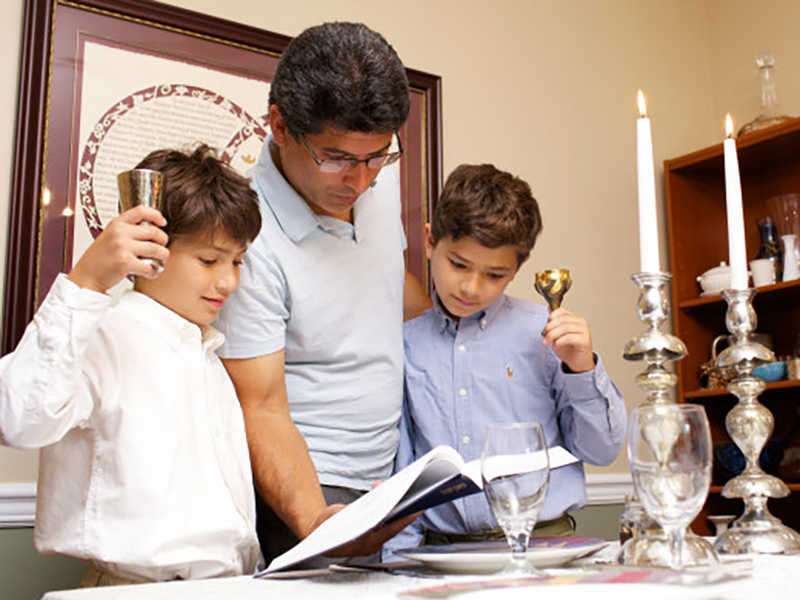On the eighth day after the commencement of the consecration of Aaron and his sons as priests, Moses summons his brother and nephews to complete the ritual. Aaron is to present various offerings, after which Moses tells him, “Adonai will appear to you” (Lev. 9:4). At the end of the ritual, Moses and Aaron come out of the Tent of Meeting and bless the people, at which point, “the Presence of Adonai appeared to all the people” (Lev. 9:23). The people “saw, and shouted, and fell on their faces” (Lev. 11:24) in awe of what they have seen. Aaron and his sons have inaugurated their work as priests, God has endorsed their work, and the people are impressed. A perfect end to a perfect day.
Then, suddenly, “[Two of] Aaron’s sons, Nadav and Avihu…offered before Adonai alien fire, which had not been commanded…And fire came forth from Adonai and consumed them; thus they died…Then Moses said to Aaron, ‘This is what Adonai meant by saying: Through those near to me I show Myself holy, and gain glory before all the people.’ And Aaron was silent” (Lev. 10:1-3).
The early rabbis struggled to explain the strange and sudden deaths of Nadav and Avihu. Their interpretations fall into two camps: One view focuses on the sins that might explain their deaths, while the other portrays them as righteous individuals whose death cannot be explained. One midrash (Sifra, Mekhilta d’Milu’im 21) links their fate to Exodus 24:9 -- “Then Moses and Aaron, Nadab and Avihu, and the seventy elders ascended [Mount Sinai].” This midrash imagines Nadav and Avihu, resentful of their position relative to that of their uncle and father, saying, “Someday, these two old men will die and we will lead the people,” suggesting that their impatience and disrespect for their elders led to their death.
Another midrash in the same collection criticizes Nadav and Avihu for showing disrespect to Aaron and failing to consult with Moses before making their offering. Responding, perhaps, to the apparent severity of their punishment, another midrash (Leviticus Rabbah Aharei Mot 20:9) claims that Nadav and Avihu had committed multiple sins, each of which was punishable by death: They entered the sanctum drunk, improperly dressed, and without washing their hands and feet. We are also told (ibid. 20:10) that Nadav and Avihu had avoided marriage, because they thought no woman was worthy of them given their exalted lineage.
As painful as it might be to read commentary trying to justify the death of the two young men, the other approach, which sees their deaths as a confirmation of their sanctity, is equally unsatisfying. One midrash (Sifra, Mekhilta d’Milu’im 23) imagines Moses comforting Aaron by assuring him that it was because of the greatness of Nadav and Avihu that they were chosen by God to sanctify the Tent of Meeting; they are, as it were, the pure offering that completes the inauguration of the sanctuary. Even the sages behind these explanations cannot offer a cogent reason why the inauguration of the sanctuary requires human deaths.
Reading these midrashim, I am struck by how incomprehensible death is, particularly the death of the young. Many of us who have lost loved ones are familiar with problematic and even painful attempts by those seeking to comfort us to “explain” the deaths that have left us bereft, or the awkward questions from people wondering if the death can be rationalized by a particular choice or habit. This type of experience leaves me wondering if I want to scream at the creators of these midrashim to stop explaining the inexplicable, or whether I should see in their unsatisfying explanations a human need to offer answers when none offer a shred of comfort.
The most honest and believable response to the death of Nadav and Avihu comes from Aaron. The bereaved father, whose triumphant ascension to the high priesthood has been forever marred by the death of two of his children, is silent. He does not rail against God, but neither does he affirm Moses’ suggestion that his sons’ deaths contributed to God’s holiness or glory. Many of the commentators claim that Aaron’s silence should be read as an acceptance of the Divine decree.
In my view, this interpretation, while certainly pious, is an overreach. What could Aaron possibly say? There are no words. How can Aaron and his remaining sons approach their priestly duties with two members of their family dead at God’s hand? How can he leave the Tent of Meeting at the end of the consecration rituals and go home to the rest of his family members and explain what has happened? How can he work with his brother after Moses offers him such cold comfort for the loss of his children?
The parashah pivots after this incident, diving into the laws of kashrut, detailing which animals, birds, fish, and insects may be eaten and which may not. This juxtaposition seems awkward, but I find it significant, if somewhat haunting. As a whole, Sh’mini is about life and death. The Israelites are permitted to kill living creatures for food. At the same time, they are forbidden to eat any animal that has died on its own. They are also forbidden to consume the blood of the animals they kill, because blood, we are told, is the life force. This parashah reminds us that we live with an ongoing awareness of death. We are surrounded by living beings, but every one of those living beings will die. Death may be sudden and inexplicable. Aaron’s silence speaks truth more profound than any commentary.
Explore Jewish Life and Get Inspired
Subscribe for Emails

